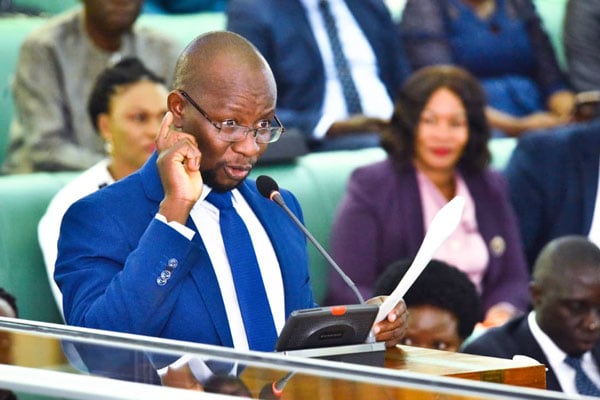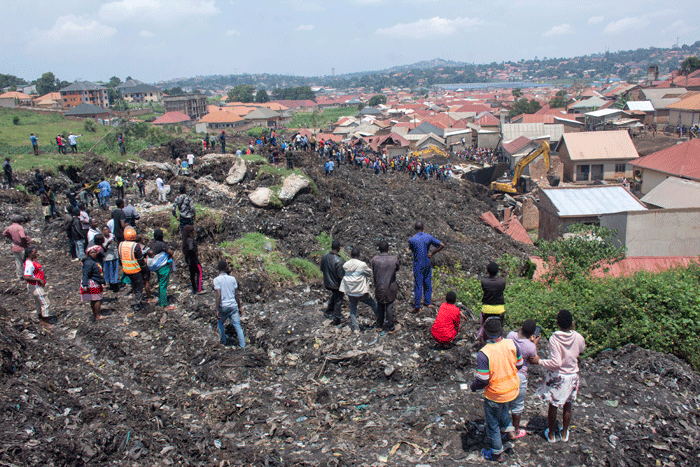
Vendors sell food at Kalerwe Market in Kampala on December 14, 2023. PHOTO | FRANK BAGUMA
Changes made in tax rates starting next financial year carry a slightly mixed bag filled with harsh consequences for Ugandan businesses engaged in regional trade and a few glimmers of hope felt in the Kenyan market.
Controversial tax increases applied on Ugandan fuel imports could raise the cost of doing business for many enterprises operating in Uganda, while an increase in excise duty levied on local cement products poses risks to commercial competitiveness in regional markets.
The excise duty rate charged on petrol was raised from Shs1,450($0.38) per litre to Shs1,550 ($0.41) per litre in the next financial year while excise duty levied on diesel was increased from Shs1,130 ($0.29) per litre to Shs1,230($0.32) per litre in the financial year 2024/25 according to government data. The excise duty rate levied on cement products has been raised by Shs500 ($0.13) per bag.
A fresh excise duty tax of Shs2,500 ($0.66) per kilogramme has been introduced on supplies of power meant for conversion into beer, a move that promises to raise production costs incurred by alcohol producers shortly. This raw material previously enjoyed a tax exemption under Uganda’s tax regime. Under the new tax measure, manufacturers of drinking water will be subject to excise duty of Shs75 ($0.02) per litre or 10 percent whichever is higher during the financial year 2024/2025.
In comparison, an increase in Kenya’s value added tax (VAT) threshold from Ksh5 million ($38,489) to Ksh8 million ($61,583) is likely to free several small businesses from the VAT compliance burden in the financial year 2024/25. Whereas this decision is expected to minimise Kenya Revenue Authority (KRA) administration costs incurred on small taxpayers.
An excise duty exemption targeted at eggs, imported onions, potatoes, potato crisps and potato chips exported to the Kenyan market but sourced from East African Community (EAC) member states is likely to boost regional trade in consumer goods.
“The new excise duty rates introduced across East Africa do not mean well for regional trade. Harmonisation of domestic taxes is yet to materialise. Whenever you ask Uganda Revenue Authority (URA) staff about this issue, they tell you they are still discussing it. But what we are seeing is a common tendency by member states of the EAC to harmonise tax administration practices instead of harmonising domestic tax rates,” said Mr Jet Tusabe, the tax director at BDO Uganda.
Besides delayed harmonisation of domestic taxes across the EAC bloc, tough budget financing choices prompted by rising debt levels, low economic growth, tax revenue deficits and growing poverty levels pose a big policy headache for the region’s finance ministers over the next 12 months.
“Difficult policy choices include maximisation of tax revenues and securing more money from the World Bank to fund government programmes. This directly ties in with ongoing discussions related to the Electronic Fiscal Receipting and Invoicing System (EFRIS) and the anti-homosexuality law,” observed Mr Allan Lwetabe, the investment director at the Deposit Protection Fund of Uganda.
He added: “That aside, Moody’s downgrade offers a tough wake-up call to government over fiscal health matters. Under current circumstances, failure to fix fiscal policy gaps might lead to extreme financial distress in less than two years’ time,”
Uganda’s budget resource envelope has increased from Shs52.736 trillion ($13.9 billion) in the financial year 2023/24 to Shs72.13 trillion ($19.1 billion) for financial year 2024/25.

Traders who operate on the ever busy Nabugabo Road were seen seated outside their closed shops on the second day of the countrywide sit-down strike against the EFRIS tax system on April 17, 2024. PHOTO | MICHAEL KAKUMIRIZI
Reactions to national budget...
Ms Claire Aipo, deputy RDC of Kaberamaido:
I want to see more funding allocated to infrastructural development.
Odo Tayebwa, former Bushenyi Ishaka Municipality MP:
I have been a member of the Budget Committee of Parliament, but the way this Parliament is doing business is shameful. Corruption is the order of the day. People have money in bags, the budget will not help us unless the Members of Parliament change their mindset.
Richard Oculi, farmer:
The government should have put a lot of money into the health sector because what consumes a lot of the citizen’s money is health care. If you become sick and you go to the hospital, you will spend a lot of money to buy drugs and hospital bills.
Raphael Okiror, head teacher:
The government should put more funding in the education sector by increasing the pay for teachers to between Shs1m and Shs2m.
Stephen Ampeire Kasyaba, Rubanda District chairman:
In the 2016 presidential campaign, President Museveni promised that the government would reconstruct Rubanda Technical School and tarmac all tourism roads. All these promises are not yet honoured.
Olema Sultan Majid, businessman in Koboko:
The government always has priorities but lacks implementation, especially the late transfer of monies to the respective implementing agencies.
Precious Ainembabaazi, business woman in Mbarara City:
In this budget, the issue of the high cost of electricity should be addressed because it is generated from here, but it is still expensive.
Thodias Ainamaani, taxi operator on the Mbarara-Bushenyi road:
I expect this budget to address high prices of fuel because...the prices of sugar, salt, and vaseline are all high. Passengers also pay little money, yet we spend a lot of money on servicing vehicles due to poor roads.
Eunice Akoth, district councillor:
The increase in allocation in the health sector should address maternal and child health challenges.
Erasto Kibirango, Luweero District chairperson:
In Luweero, we appreciate the commitment by the government to construct the hospital block now under progress by the UPDF Engineering Brigade. The farmers are waiting for the juice processing plant.
Badru Abasi Ssenonga, businessman in Masaka:
Cutting the agriculture budget by 37 percent yet it has been one of the unfunded sectors for decades is going to further worsen the situation.
Carol Mukisa, human rights enthusiast:
I applaud the budget estimate for being more gender-sensitive, indicating a score of 67 percent in compliance and for being a bit more deliberate on cutting down the unproductive expenditure, as compared to FY 2023/2024.
Alvin Sabiti, researcher:
While there is a substantial allocation to the health sector in the budget, there are questionable priorities. Allocating Shs 57.8b towards the Covid-19 response seems disproportionate compared to the mere Shs 20.05b for rehabilitating hospitals. What about HCIVs, IIIs, and IIs in a deplorable state?
Siraje Bogere, sugarcane farmer:
Sugar cane farmers should be facilitated. Whenever the budgets are read, farmers are sidelined.
Johns Sserwanga,101, retired journalist in Masaka City:
The whole concept of budget reading has lost meaning and you can no longer find people eager on radio or TV waiting for the reading of the national budget as it was the case in the past. The locals will continue to view the budget as a tool of a few elites that benefit from it.
Compiled by Bill Oketch, George Muron, Emmanuel Eumu, Hillary Twinamatsiko, Julius Byamukama, Felix Ainebyoona, Milton Bandiho, Jovita Kyarisiima, Rashul Adidi, Joseph Omollo, Fred Wambede, Dan Wandera, Malik Fahd Jjingo, Rachael Nabisubi, Rhona Nahabwe









